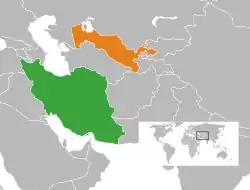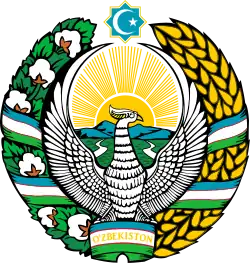Iran–Uzbekistan relations
Iran–Uzbekistan relations refers to the diplomatic relations between the two countries, Uzbekistan and Iran, which have deep cultural and historical ties between them. Both countries are members of the Economic Cooperation Organization (ECO).[1]
 | |
Iran |
Uzbekistan |
|---|---|
Importance
Iran is an Islamic theocracy, while Uzbekistan is a Secular dictatorship.[2] The two nations have been apprehensive on their difference of politics, but still have been active in improving their relations.[3] They also have ancient cultural ties with each other, with Uzbekistan being a part of Ancient Persia, Sogdiana, and Bactria. It is considered a part of Greater Iran.
Trade
Iran and Uzbekistan have agreements between themselves to cooperate in various fields including, agriculture, transport, oil and gas production, construction, pharmaceuticals and banking.[4] The two nations have also worked on overland links and other joint ventures.
Uzbekistan exports many commodities to Iran including cotton, ferrous and non-ferrous metals, fertilizers and chemical fibers. Iran exports construction materials, detergents, foods, tea and fruits to Uzbekistan. The Iranian-Uzbekistan trade turnover exceeded $600 million in 2008.[4]
In 2018, Uzbekistan's ambassador to Iran stated that they intend on increasing their trade volume with Iran, by expanding bilateral ties and enhancing cooperation with Iran, according to Mehr News.[5]
References
- "The Secretariat of Economic Cooperation Organization". Economic Cooperation Organization. Archived from the original on 2016-04-14. Retrieved 2017-01-23.CS1 maint: unfit URL (link)
- "Constitution of the Republic of Uzbekistan". ksu.uz. Archived from the original on 2016-06-27. Retrieved 2014-12-24.
- "Uzbekistan – The Middle East and Pakistan". Countrystudies.us. Archived from the original on 2016-11-03. Retrieved 2013-09-06.
- "Central Asia At Close Range". Archived from the original on 2009-08-21. Retrieved 2017-01-23.
- "Uzbekistan keen on expanding economic ties with Iran". Archived from the original on 2019-12-27. Retrieved 2020-05-10.

